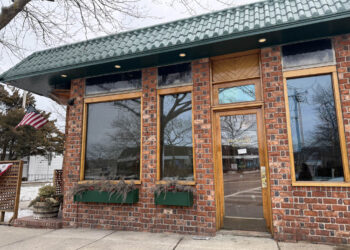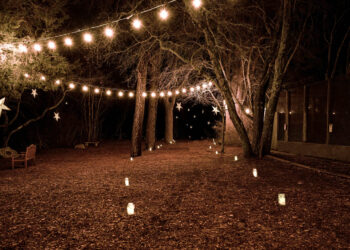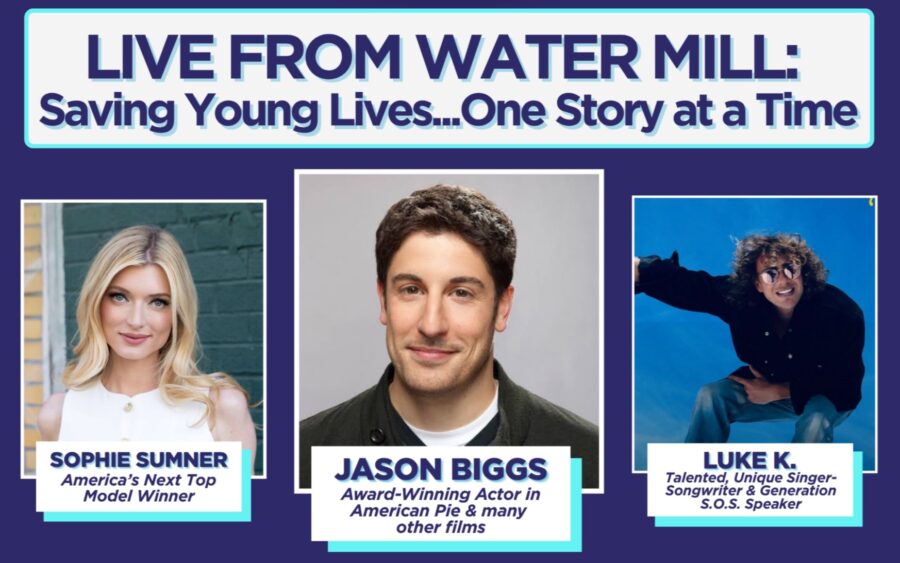 On Sunday, August 24th, from 5:00 to 8:00 p.m., Generation S.O.S. will host their annual summer fundraiser in Water Mill, NY—an inspiring evening designed to raise awareness around substance misuse and mental health challenges facing today’s youth.
On Sunday, August 24th, from 5:00 to 8:00 p.m., Generation S.O.S. will host their annual summer fundraiser in Water Mill, NY—an inspiring evening designed to raise awareness around substance misuse and mental health challenges facing today’s youth.
The event will feature an impressive lineup including an interview with award-winning actor Jason Biggs, a live performance by singer-songwriter and Generation S.O.S. speaker Luke K., and will be MCed by actress, model, and TV host Sophie Sumner. Guests can enjoy the event in person at a stunning private residence with dinner and refreshments or they can tune in via livestream.
Generation S.O.S. is a national nonprofit focused on helping teens and young adults make informed, healthy choices by fostering connection and open dialogue. Through real stories, lived experiences, and meaningful peer interactions, the organization encourages honest conversations, offers practical coping strategies, and builds supportive communities for young individuals.
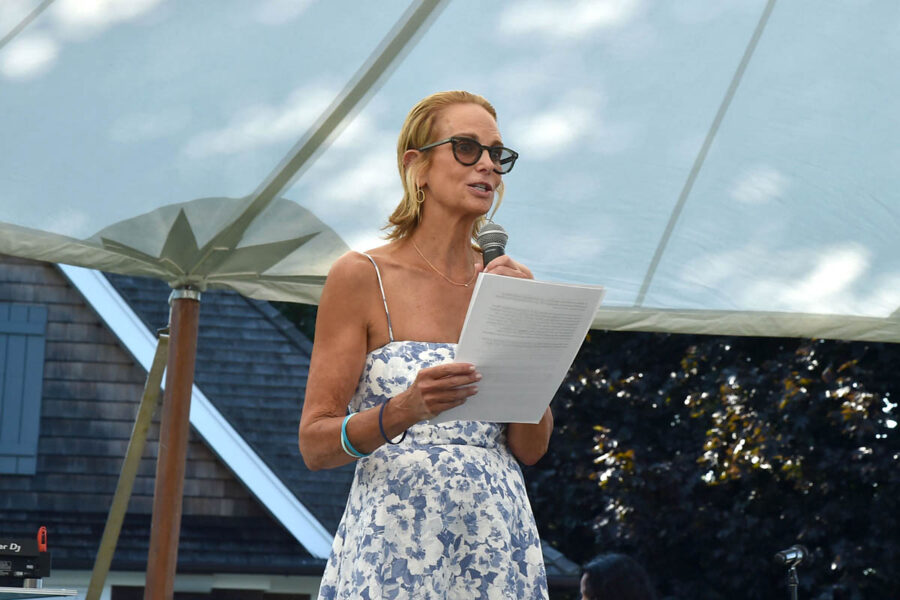
Founder Robin Kiam Aviv spoke about what led her to launch the organization, the impact it’s having on youth around the country, and why this event plays such a vital role in continuing the mission.
To learn more about Generation S.O.S. and to purchase tickets for the event on August 24th, click here.
What is the mission of Generation S.O.S.?
RA: The mission of Generation S.O.S. is to empower teens and young adults to make lifesaving choices about substance misuse and other mental health issues. We do this through the power of peer-to-peer storytelling. We are the only national peer-to-peer non-profit in the prevention space.
Why did you start Generation S.O.S., and what does the organization mean to you?
RA: I started Generation S.O.S. following six tragic overdoses in the NYC school community. Six kids died in a three-month period, and not one of the schools did anything meaningful in response. I was just rolling off from being president of the Parent Association at one of the New York City schools. I was sure I could convince the schools to respond with something impactful for the students. The schools did not want to embark on this suggestion…why? The shame…the stigma…none of the schools wanted anyone to think that they had a problem. Of course, they ALL had a problem.
Opioids changed the landscape of addiction. OxyContin creates an easy path for addiction. And with Fentanyl laced drugs, all it takes now is a one-time experiment to become a tragedy. Kids need to be educated about this. And who better to educate them than a young recovering addict who has been through the experience of addiction and is now thriving in life.
We started meeting in a living room and brought in a young recovering addict to share their story with the kids. We saw the magic that happened when a young speaker shared their raw and relatable story about mental health/societal challenges that led to substance misuse, addiction and then the life lessons they have learned.
Kids listen to their peers. These young speakers share the mental health/societal challenges (depression, anxiety, peer pressure, bullying, divorce, learning challenges, disordered eating, etc.) that led them to misuse the substance in the first place. Then, the speakers share coping strategies they have learned so they don’t have to pick up a substance as the quick fix to overcome uncomfortable feelings.
What issues does Generation S.O.S. aim to address?
RA: Generation S.O.S. is about awareness and safety. We are in the prevention space. We do not preach abstinence. We try to get the messaging to kids before they are faced with dangerous, sometimes life-threatening choices. Our speakers share their most intimate struggles and stories. Kids realize they are not alone with their feelings.
Our peer-to-peer model opens up this difficult conversation and gets kids talking about the topics and feelings that they would rarely, if ever, discuss with an adult. Our goal is to let kids know there are others experiencing the same struggles. There are tools and coping strategies out there to help, and there is free peer- to-peer assistance with substance use/misuse if they feel like they have crossed the line.
What types of programs or support does the organization offer for teens?
RA: We offer free programs to schools, community centers, churches, synagogues, under resourced communities, indigenous lands, fraternities, sororities, prisons, and anywhere young people gather. We bring in a young person to share their story around mental health challenges, addiction, recovery and coping strategies. After the speaker shares, there is a Q&A where the real magic happens, and kids open up about their innermost feelings. Our speaker always gives out their contact info in case a student needs the support of a 12-step program. If that is the case, our speaker will take them to a 12-step meeting and connect them with a sponsor so that they can begin their recovery journey. But as mentioned earlier, Generation S.O.S. is in the prevention space, so the goal is to get to kids well before they experience trouble with substances.
Once kids attend one of our events, they have the option of bringing Generation S.O.S. to their school or community in the form of a school club. We provide them with all the structure, tools and speakers so they can lead meetings on a regular basis. Our school club model is one of the things that make our program so unique. It is not a “one and done” presentation. Instead, the messaging continues throughout the year, so the kids keep hearing about relatable challenges and healthy solutions. These school club leaders then join our Youth Advisory Board and meet monthly with other kids around the country via Zoom to share best practices, and the impact they are having in their community.
How has the Generation S.O.S. community grown since its founding?
RA: Generation S.O.S. started out in my living room. We are now in schools and communities all over the country and will reach over 100,000 kids in person this year and many more virtually. We have a high school youth advisory board, a college advisory board, a middle school advisory board and we just launched a young professionals board. It is through these youth board members that we are expanding across schools, community centers, under resourced communities, indigenous lands, prisons, and other youth groups.
How important are fundraising events to the impact you’re able to make?
RA: All our programs and events are free of charge. We have one major fundraising event every year in August in Water Mill, New York. This event is EXTREMELY important so that we can continue to offer our programs free of charge.
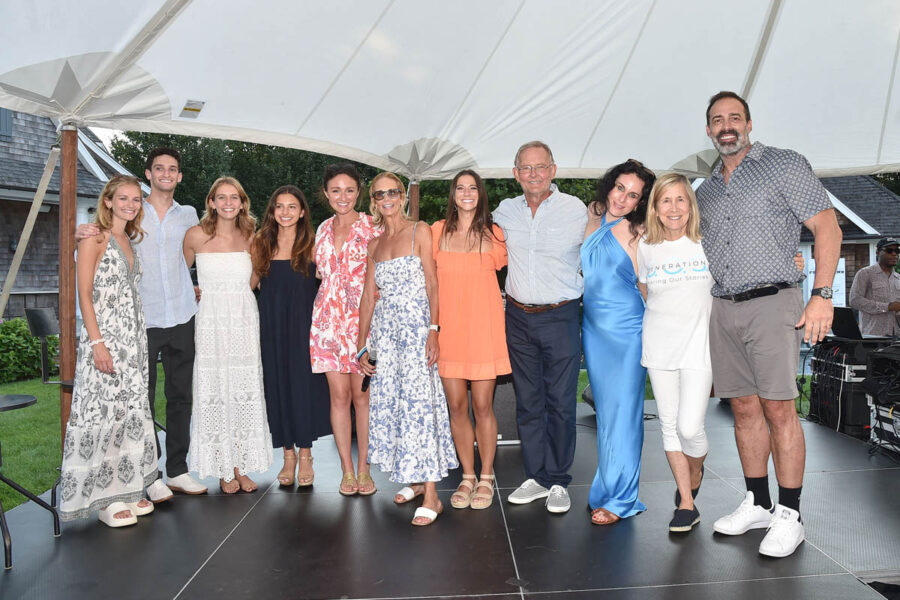
What can guests expect from the Water Mill event?
RA: The Water Mill event will be an evening of community, connection, and inspiration. The audience will hear about our headliner Jason Biggs’ struggles, how he got there and how he has overcome them. This will all be communicated via a fireside chat where Jason will be interviewed by some of our young adults. The guests will then experience a concert under the stars by Luke K, who is an outstanding up-and-coming musician and one of our wonderful young speakers. Refreshments and dinner will be served. Attendees will also learn more about Generation S.O.S., our programs, our impact and how to get involved. All of this will be MCed by TV host and Americas Next Top Model winner, Sophie Sumner. It is surely going to be a night to remember!
What are you most looking forward to at this year’s event?
RA: I am looking forward to learning more about Jason’s story, hearing Luke K. perform, and sharing about our new initiatives and how much we have impacted kids through our work.
Do you have any memorable moments from past events you’d like to share?
RA: Last year, Hank Azaria shared with the audience, “the opposite of addiction is not abstinence or sobriety, it is connection.” And fostering connection is exactly what we are trying to do at our Water Mill event and in all our other programs.
What do you hope people take away after attending the event?
RA: I hope people take away that substance misuse is preventable, and that the work that we do has had profound impacts on the young adults we have reached. It is so important to get to kids while they are first experiencing uncomfortable feelings around societal and mental health challenges. It is imperative to get kids talking about this before they get into trouble. Like our North Star states, “It is so much easier to build strong adolescents than to repair broken adults.”
Is there anything else you’d like to share about the organization or the importance of this event?
RA: If there had been a Generation S.O.S. around when I was young and struggling, it would have been a game changer for me! I am a recovering addict and while I did get sober a long time ago, I believe I would have heard the message and gotten help at a much younger age had Generation S.O.S. existed.
We want our program to be in every school in America to help save a generation of youth that is struggling more than any other generation in history. We hope this event will help us get there!
Head out for an evening of inspiring, important stories and community on Sunday, August 24th! To learn more about Generation S.O.S., get involved, or purchase tickets for the Water Mill event, visit here.


